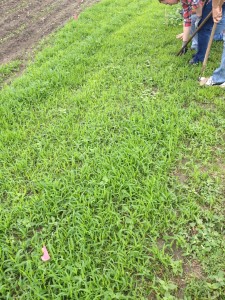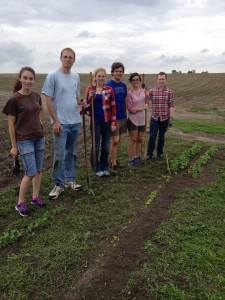The day began with a Memorial Day service at the Radcliffe Cemetery. We honored those who served in the previous wars by reading out all of the names of the veterans. There were soldiers from the Spanish-American War all the way to the Vietnam War. There were soldiers from both the Confederate as well as the Union side of the Civil War, as well as a few women mentioned, one being a nurse. It was a nice ceremony, and I am glad we showed our respect to those who served our country and fought for our freedom. They really are the super heroes of the nation, as the speaker was saying.
When we got back to the farm, we got to go in the garden and pull weeds. Dalona planted us a garden before we came and we saw the effects that happen to a garden if you don’t care for it for a few weeks. The weeds had taken over, but with all of us working together we got those weeds out efficiently and had the garden looking nice.
The next part of our day was spent watching the movie, Symphony of the Soil and learning the perspective of organic farming and treating the soil as the most important aspect. The Green Revolution introduced putting nitrogen into the soil to increase productivity. This brought about the demand for pesticides as well. Putting the nitrogen in the soil brakes down the carbon in the field so the plants can feed on them. What they are trying to encourage now is the no-till practice. With 1/3 of the land being unusable for farming because of erosion, no till has become a popular practice in some quarters because it is more natural and allows earth worms to aerate the soil, making it healthier. There are also farmers like Denny Friest, however, that do till the land to stimulate the decomposition, and he believes it produces a higher yield for him that way. He is also uses less nitrogen on his field to improve water quality, so the environment is improved even though he isn’t practicing no-till like the movie wanted. The movie’s main point was that they wanted all that was taken out of the soil to be returned to it, and so the soil is so rich that GMOs are not needed. The movie’s perspective was that biotechnology would not solve the problem of feeding a planet with 9 billion (the projected world population in 2050) people on it.
The second movie, starring Denny Friest, was titled Ocean Frontiers and focused on why we need to protect the Earth. The film makers went from coast to coast, including talking to farmers in Iowa about reducing the amount of nitrogen escaping from the agricultural lands, which are responsible for creating the Dead Zone in the Gulf of Mexico to conservationists and shippers in Boston, Massachusetts who were trying to find a way to move ships to the Port of Boston without disturbing whale habitat. They movie crew also visited the Florida Keys and an Oregon fishing town to see how multiple stakeholders came together to see how their livelihoods were linked to better stewardship of oceans. The movie was important in its message of protecting the wild life that live in the oceans so we can continue to enjoy them for generations to come as well as keeping the animals flourishing to continue the circle of life.
The last thing to mention is our chapter in Food Politics about the problems we face with the rising obesity rates. Worldwide obesity has nearly doubled in the last three decades and are no where near declining. We are projecting that the U.S. life span will shorten by 2-5 years by 2050. As Americans spend more time in front of computer and television screens as well as jobs that revolve around sitting in a desk, this lack of physical exercise contributes to obesity. Also, the way we eat has changed drastically. From eating fresh foods to now eating fast, processed foods high in calories and sugars have helped us to change in weight. The leaders in this contribution have been an increase in red meat consumption as well as sugary drinks and potatoes, especially chips. In my wellness course, I learned the reason we love chips is not our fault. The chip companies spend tons of money testing the exact crunch that will make our brains want more as well as a flavor that is powerful, but disappears quickly making us want more. The chips also are not filling so our brain does not tell us to stop, leading to an overconsumption of them. The food companies control us in a way by making us crave their products that are high in calories and high in sugar, which are bad for us and cause us to gain weight, especially if we are sitting most of the day. In 2010, a study by the OECD found that our government is doing a poor job in changing these statistics by relying on information campaigns and subsidies to try to make us make healthier choices. It is not completely the government’s fault that we are fat as a nation, but if they don’t do something to make a change, tons and tons of our money will go into treating the raising numbers of diabetes and hypertension, all of which are preventable if we change our eating habits and increase exercise.


